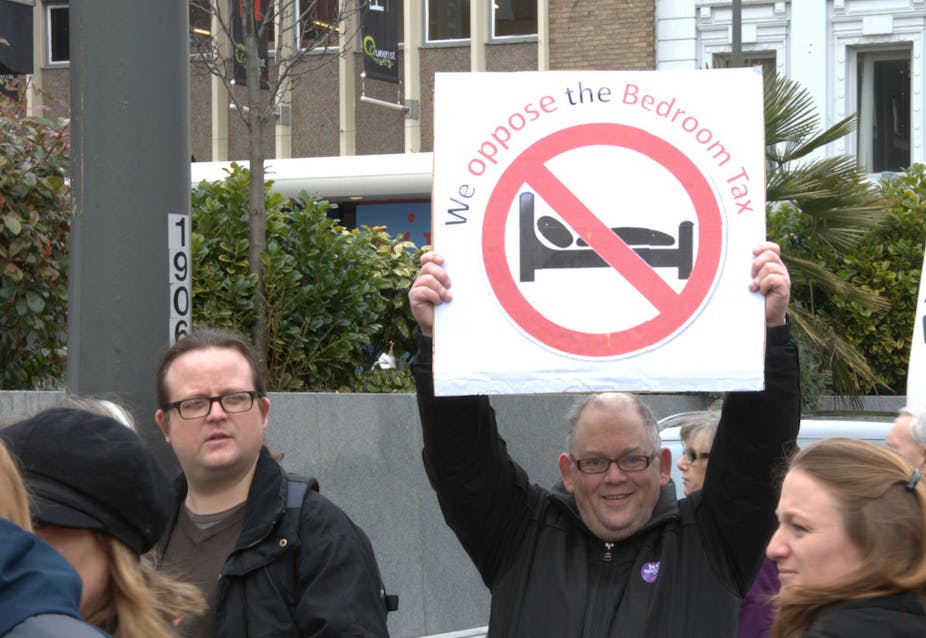A consequence of the momentous debates unfolding following the Scottish referendum is the growing call for the north of England to be given greater control over how resources are used to tackle regional inequalities within England.
The north of England has long suffered from the problem of “the north-south divide”. One manifestation of this is the highly visible health divide between north and south. The north suffers much poorer health than the rest of England, with lower life expectancy and earlier onset of chronic illness and disability.
This divide masks another stark division in health: the one between rich and poor areas in every region in the country. On average, poorer groups die earlier and get sicker quicker.
The underlying causes of both health divides are largely the same: differences in poverty, power and resources needed for health. One of the consequences of the uneven economic development in the UK has been higher unemployment, lower incomes, adverse working conditions and poorer housing in the north, all of which have adverse impacts on health and increase health inequalities. Policies made in Westminster have so far largely failed to address this problem.
In our recent Due North report we outlined how organisations and communities in the north could make the best use of devolved powers to turn the tide on the unacceptable health inequalities that exist within the north and between the north and the rest of England.
Austerity falls hardest on disadvantage
Although these are longstanding patterns, there is a renewed urgency in tackling these two health divides. The austerity measures introduced in response to the 2008 recession have fallen more heavily on disadvantaged areas than on affluent ones and on the north in particular, which makes the situation even worse. At the same time, welfare reforms are increasing poverty and pressure on services in the worst-hit areas, particularly among families with children, which compounds the crisis.
Cuts in local authority spending illustrate the unfairness of the austerity measures. The cuts to local authority budgets are deepest in northern authorities and this increases as the levels of disadvantage in an area rises.

This sets up a perverse situation: where the need is greater, the cuts are bigger. Children’s services are among the hardest hit, as councils seek to protect statutory duties on adult social care.
Welfare reforms are making already poor families poorer. For the first time in more than 17 years, child poverty in the UK increased in absolute terms in 2011-12, reflecting cuts in income for families, as well as lower wages. Further substantial increases in child poverty are predicted, threatening the life chances of the most vulnerable in society.
Unfair Whitehall solutions
One particularly vexing measure has been the introduction of the bedroom tax, in which amounts are deducted from housing benefit if a family is deemed to live in accommodation with more bedrooms than they need. This is a classic example of London-centric policy-making.
The bedroom tax, at best, is an attempt to deal with overcrowding and pressure on housing in the south-east. At worst, it is a ploy to cut the benefits bill by alleging that overcrowding in some properties is caused by under-occupancy in others, which is just not the case in the north, and probably isn’t in the rest of the country either. It has been applied indiscriminately to the north, where there is a greater reliance on social housing. This is rarely built with one or two bedrooms only and the private rental market is under-developed for this restricted type of accommodation. The consequences are therefore dire for families who cannot move, and can be seen in increasing poverty rates and the rise of charitable food banks offering last-ditch help to families with falling incomes.
It is mismatched measures like these, imposed from Whitehall, that are fuelling frustration among agencies in the north and spurring on demands for greater devolution of powers to do things more effectively and equitably.
It is against this background of a serious and deteriorating situation that the Independent Inquiry into Health Equity for the North was set up by Public Health England in January. The inquiry, and the report which we published, brings a northern perspective to the nationwide problems of what to do to reduce health inequalities between rich and poor areas – within the north, and between the north and the rest of the country.
The report recommends that agencies – local authorities, voluntary agencies and the NHS – work much more closely together to prevent poverty and promote prosperity, with a key focus on protecting and supporting children’s health and development in the early years. This will involve increasing the proportion of overall expenditure allocated to the early years; providing high-quality universal early years education and childcare; committing to protecting children’s rights to the best possible health; promoting a living wage; improving the quality and affordability of housing; and using the joint spending power of the public sector across northern regions to promote good employment.
This means transforming how the £136 billion of public money that is spent in the north each year is used to promote the well-being and capabilities of people in the north.
Northern agencies, however, can only do so much: central government policy is both the cause and the solution to some of the problems analysed by the inquiry. Urgent action is needed to ensure that investment is effective at reducing inequalities and to prevent austerity measures widening inequalities. This includes allocating a greater share of resources to the places that need it most – and developing a national industrial strategy that reduces inequalities between regions by devolving powers and investing in sectors that promote sustainable employment in disadvantaged areas.
We have lived with the health divide for too long, and action is long overdue – the recommendations in our report take a northern perspective, but they address a nationwide problem and provide a way forward.

